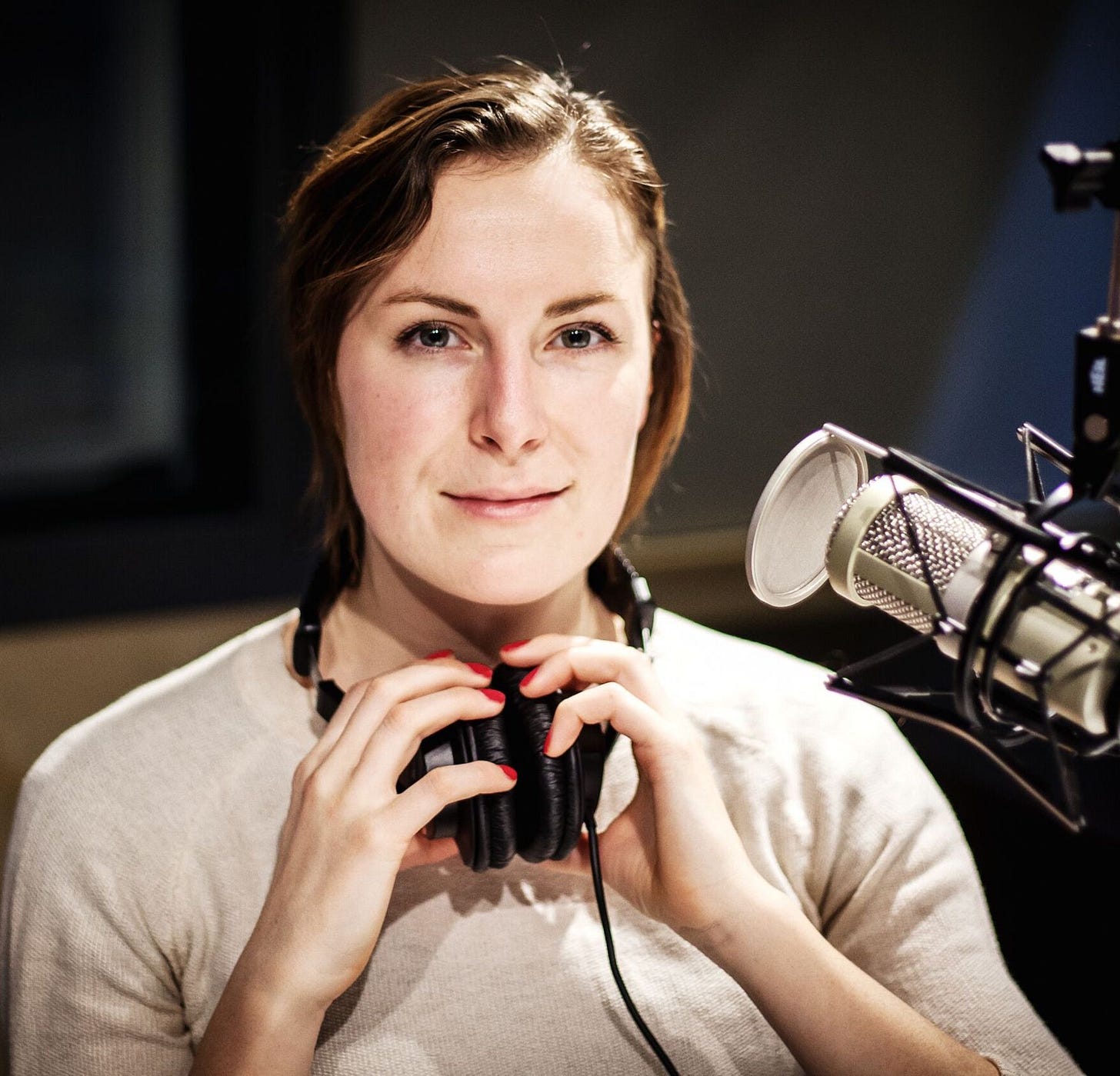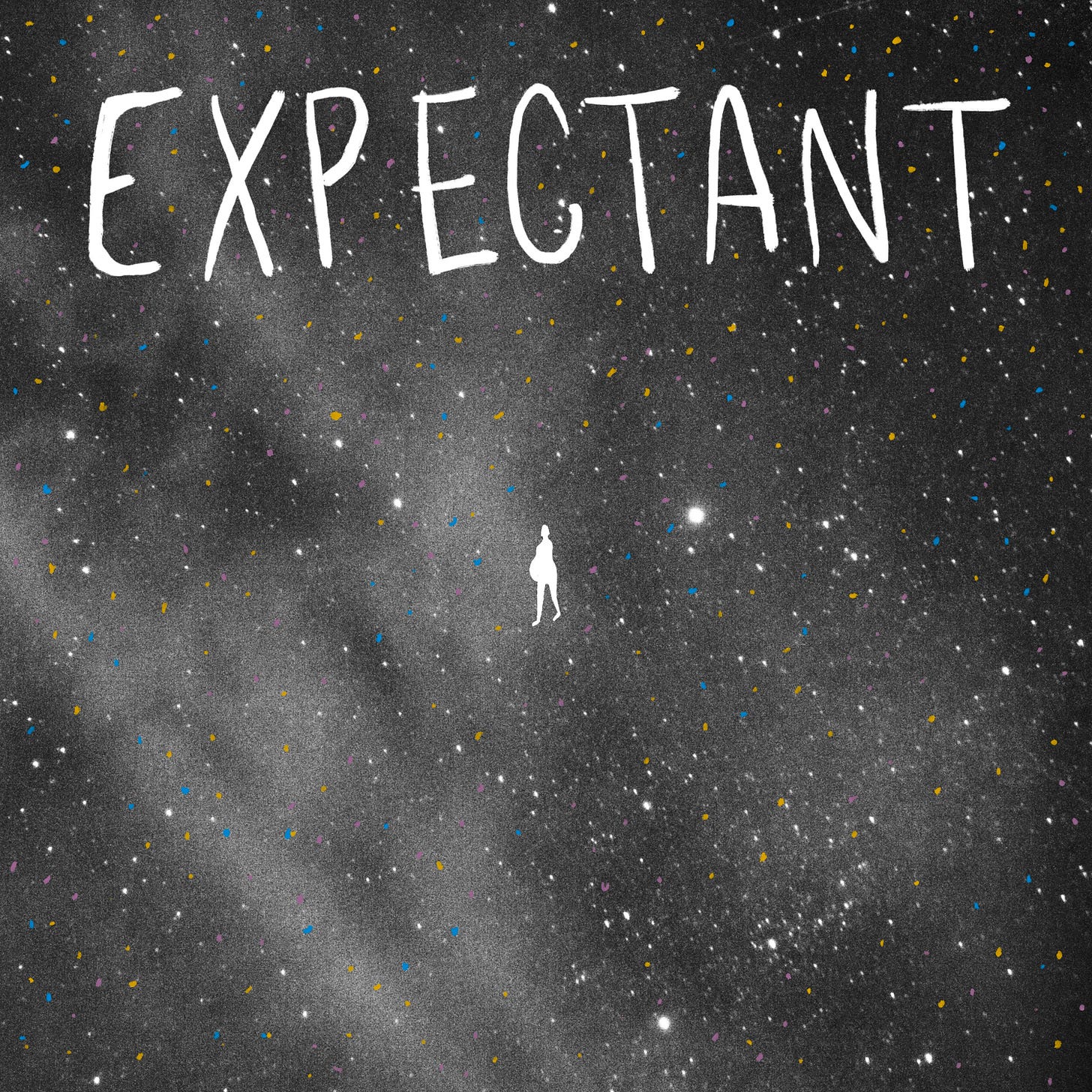Pippa is an audio producer living in Tkaronto*, originally from the west coast. Her work started in theatre and evolved to audio after doing an MA in Media Production at TMU, and since then, she’s produced radio dramas, audiobooks and podcasts, including Word Bomb, a show she hosted for 4 years with TVO, and now, Expectant.
Follow @bigpippa on Instragram, @pippajohnstone on Twitter
*Tkaronto is the original or Indigenous name for Toronto, Canada.
I first learned of Expectant in various podcast newsletters and was excited about how the show was going to creatively tackle a very difficult topic: child rearing in the age of the climate crisis. I was then delighted when I received a pitch from show creator, Pippa Johnstone, to be featured in this newsletter. This interview was conducted via Google doc, so no audio this time. But that means more time to listen to Pippa’s show! Check out the trailer below and learn more about the show’s origins in our interview.
To start, can you share a little about your journey into storytelling.
I worked in theatre originally, mainly as an actor, and while I loved that work, I often found that the choice of which story and how to tell it wasn’t in my control. After discovering the world of audio producing, I totally fell in love with creating with just sound and voice. And by moving into producing and writing I’ve found a lot more agency.
Let’s jump in to talking about Expectant. To be transparent, I really don’t listen to fiction podcasts. However, I felt compelled–because of the subject matter–to listen to your show, which you’ve marketed as a hybrid between fiction and non-fiction. Why did you feel this hybrid approach was the best way for you to share this story?
I’ve heard the same from so many people who don’t usually listen to fiction podcasts! I think this show scratches the nonfiction itch still but gives you a narrative to connect to. I call it fiction but it’s more like “fiction,” because the story is super personal, maybe speculative fiction would be the right genre.
For me, the blending of fiction and nonfiction felt like the truest way to represent how I feel about this question. And I wanted to ask questions of the experts I admire or the people in my life who have faced this question in their life or work. Plus, this allowed me to write as bravely as I could, and ask people questions, two of my favourite things.
What would be your pitch for podcast fiction skeptics to listen?
My pitch would be: it’s not really all that fictional. There are scenes, the situation is fictional, but really it’s just a story following one person trying to make this difficult decision.
I read in your interview with Pod the North that Expectant was originally envisioned as a theater piece. How would the approach for a theater piece be different from the audio piece you went forward with?
Yeah, I was initially working it up as a solo show. I had a bunch written — some that translated to the podcast, some that didn’t. And I was going to use the tape in the play, so the character would really be on stage reacting to the audio. I think the play was at times funnier or goofier, more direct-address, more stylized. The podcast feels more pared down and honest, but it still gets weird and immersive at points.
This is decidedly not an objective piece. And I’m not sure about you, but having to edit something that is emotionally fraught can be difficult. How was the editing process for you?
The process had ebbs and flows. I had some really tough times making this, sitting with a question like this for so long has been painful at times. And then other times it’s been creative and collaborative and hopeful. But there were chunks of the process where just opening the script file felt too hard, so I’ve taken breaks.
There were a lot of interviews, full interviews, I cut. I had a lot of stuff about how productivity mindset or internalised capitalism fed into this decision. Which is connected thematically, but not as literally connected as I wanted the show to be. If I opened the door to other factors that affect the decision the project would be trying to be too many things, so I kept it really narrow, and killed a lot of darlings.
In your show, it’s clear that you talked to a lot of different people to get their input on the big question, but what are some of the media resources you consulted to help develop your podcast?
I mostly read books — Generation Dread by Britt Wray, Braiding Sweetgrass by Robin Wall Kimmerer, All We Can Save, edited by Ayana Elizabeth Johnson and Katharine Wilkinson. I didn’t learn about it until after the project was nearly finished, but I also just discovered a podcast called Climate Anxiety and the Kid Question I’d love to shout out.
Both Expectant and Climate Anxiety and the Kid Question were both featured in the curation below on climate emotions.
There are two things that I personally feel get missed in the public discourse about having kids during the climate crisis and I am curious to hear your thoughts.
The first is, I feel there isn’t much of an acknowledgement of intersectionality in the discussion. I myself will probably never have biological children, and yet what comes to mind first for me are the extremely high maternal mortality and morbidity rates for Black women, police brutality, ongoing systemic discrimination… And yet, the outcomes for Black people as it relates to climate change are some of the most poor, but that’s not main my main concern for why not to have children.
Acknowledging first that race is just one aspect of intersectionality, have you had any conversations with people of color who have raised other concerns about child-rearing outside of the climate crisis? And if so, how have their concerns influenced their views about having children during the climate crisis?
I totally agree, there is a missing or less explored piece of the conversation, and to be transparent, my podcast doesn’t really fill it. Expectant has a super narrow focus, altogether it runs under 2 hours, and I wanted to make it extremely personal, like a journal.
But there are so many other factors that intersect with climate directly or indirectly that affect this decision. In one episode the protagonist looks at the global ramifications of this question, the fact that the people who have done the least to contribute will experience the worst outcomes, and how this breaks down along lines of race, class, and gender.
I spoke to a lot of people for the show, and racism and colonialism came up often, in ways that are so interconnected to the climate conversation. I think the question of having kids is so layered and nuanced, it was honestly a challenge to keep the focus honed in on the climate part in general. But I wanted to speak to this one slice of the decision, at least for this project.
And the second is, while I know prospective parents typically don’t talk to other kids first to see if they should have kids, I’m wondering if you think the concerns about the climate crisis should maybe change that? I bring this up because of how big of a concern climate anxiety and mental health is for Gen Z in particular.
It’s a great question, I thought about bringing younger voices in and didn’t end up doing it this time around but I would love to hear a response that does. The concerns about kids’ mental health are really the through line in the project. It’s a part of the conversation that weighs on me, and definitely factors into my own thinking.
A few years ago I had the privilege of collectively creating a piece of theatre with a group of teenagers that was about their climate concerns, and the voices of those young people were really central in my mind making Expectant.
If you were to do a second season of Expectant, what do you think it would focus on?
I’ve honestly not looked ahead too far, making an independent show has filled up my brain circuits for now. If the show were to continue, I think I’d be really interested in playing less of a central role. I would love to play the role of producer to support another season, especially if I could pass on the baton to someone else, and explore some of the things we weren’t able to this season.
Ultimately, climate optimism is essential to our survival and to us pushing forward with solutions. It seems to me you still have hope, and I wonder, what are some things you are doing to keep that hope alive?
Making the show in some ways helped me find optimism. Talking to so many amazing activists and scientists who are so motivated inspired me, as well as getting to hear from so many people who are parenting so thoughtfully. Then in gathering a team to help me make the show, and putting it out into the world, I’ve found so many like-minded people in my community who I maybe wouldn’t have spoken to about climate. It’s inspired me to talk about climate issues more, and try to build a network of others in climate work and find my place in it.
Rapid Fire
What was the last thing you listened to?
I am currently listening to Stolen – late to the party I know, but that show deserves all of its many accolades. Heavy, heartbreaking, but so, so well done.
What was the last social impact action you took?
I am trying in many ways to have influence within the small spheres I occupy. So for me right now, that looks like volunteering with local electoral campaigns, and dedicating time to climate groups that focus on the arts, a sector I feel like I can help adapt.
If you could pass the mic to someone about a social issue you care about, who would it be and what would they talk about?
As a white settler, my exploration of this question is obviously limited, as we touched on a bit earlier. There are so many young Indigenous, Black, and racialized activists doing this work - like the Sankofa Sustainability Collective, or Indigenous Climate Action - who are really living at the crux of this issue, can speak to it in a personal way, deserve support. I’d also love to hear storytelling from activists like Autumn Peltier or more from Sarain Fox, who shared her perspective in the CBC doc, The Climate Baby Dilemma.




